December 16th Transform Westside Summit: Reactivation and Programming of the YWCA Phyllis Wheatley Building
Westside Future Fund’s December 16th Transform Westside Summit highlighted the reactivation and programming of the YWCA Phyllis Wheatley Building Slated to open in 2024, the Westside landmark will be a community-based center for much-needed services and support for underserved women and children. Special guests included: Sharmen Gowens, Chief Executive Officer, YWCA of Greater Atlanta; Sarah Lattimer Irvin, Immediate Past Chair, YWCA of Greater Atlanta; Ingrid Saunders Jones, Board Member, YWCA of Greater Atlanta; and Jennifer Winn, Board Chair, YWCA Greater Atlanta. Ebony Ford, Director of Community Building and Engagement for Quest and subcommittee chair member for the Phyllis Wheatley YWCA, moderated the panel after attendees were welcomed by WFF CEO John Ahmann and co-host Benjamin Earley.
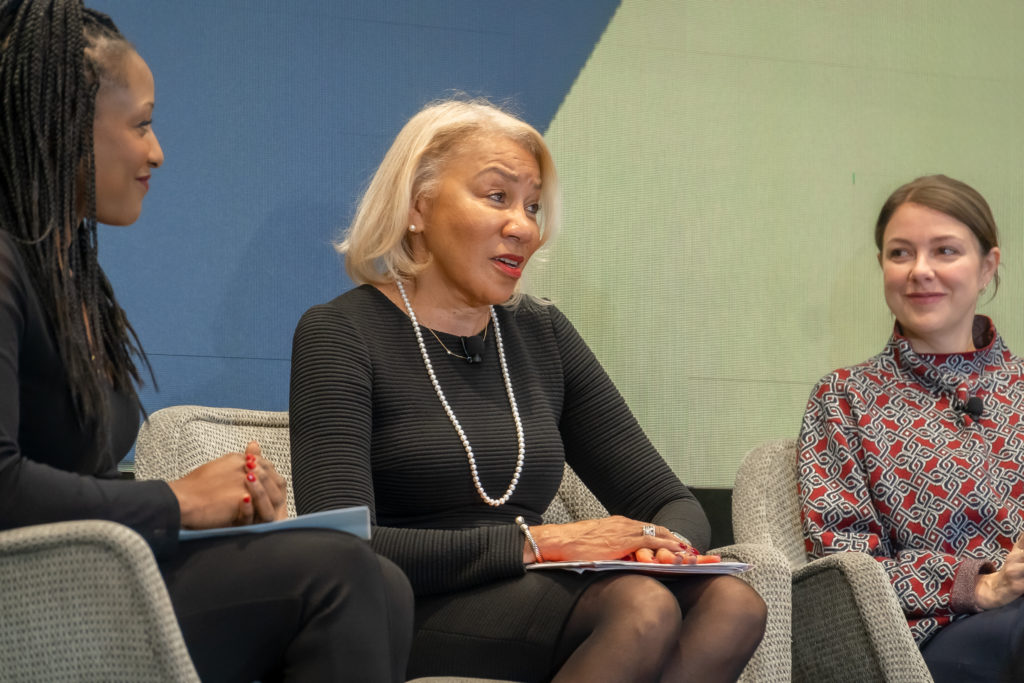
(from left) Ebony Ford (moderator), Sarah Lattimer Irvin, Immediate Past Chair, and Jennifer Winn, Board Chair, YWCA Greater Atlanta
Ford: “I’m Ebony Ford and I’m just all about the Westside. My son goes to Hollis, I live in English Avenue. I am a director at Quest CDC. I actually have a podcast here on the Westside called “Westside Wise,” and…I also serve on the subcommittee for the Phyllis Wheatley restoration project. So, it is very fitting, and I’m very honored, to be here to lead this conversation and lead this panel of awesome women today. Speaking to that, can each of you please introduce yourself and just tell us all your affiliations with the YWCA?”
Irvin: “Good morning again, I’m Sarah Lattimer Irvin, and I’m the immediate past chair of the board of directors of the YWCA of Greater Atlanta. I think I’m the longest serving board member in the YWCA history. I also chaired the subcommittee on the restoration of the Phyllis Wheatley Project…it’s my passion to get this done for the women on the Westside.”
Winn: “I’m Jennifer Winn. I’m the current board chair. I get to follow in Sarah’s footsteps, which are large shoes to fill, but I have been involved with the YWCA for about five or six years. I really fell in love with the mission of this organization, seeing all of the great work that we do. As the board started kind of visioning and revisioning this restoration, this building in this community, it just really energized me to be a part of it as well. So, I get to work with all of these incredible people and a lot of you in the audience. I’m so so happy to be here.”
Jones: “I’m Ingrid Saunders Jones and I’m a member of the board of directors of the YWCA. I am involved because this is such an incredible group of women. I do not waste my time. I learned. I figured out a long time ago that this was the proper use for my time.”
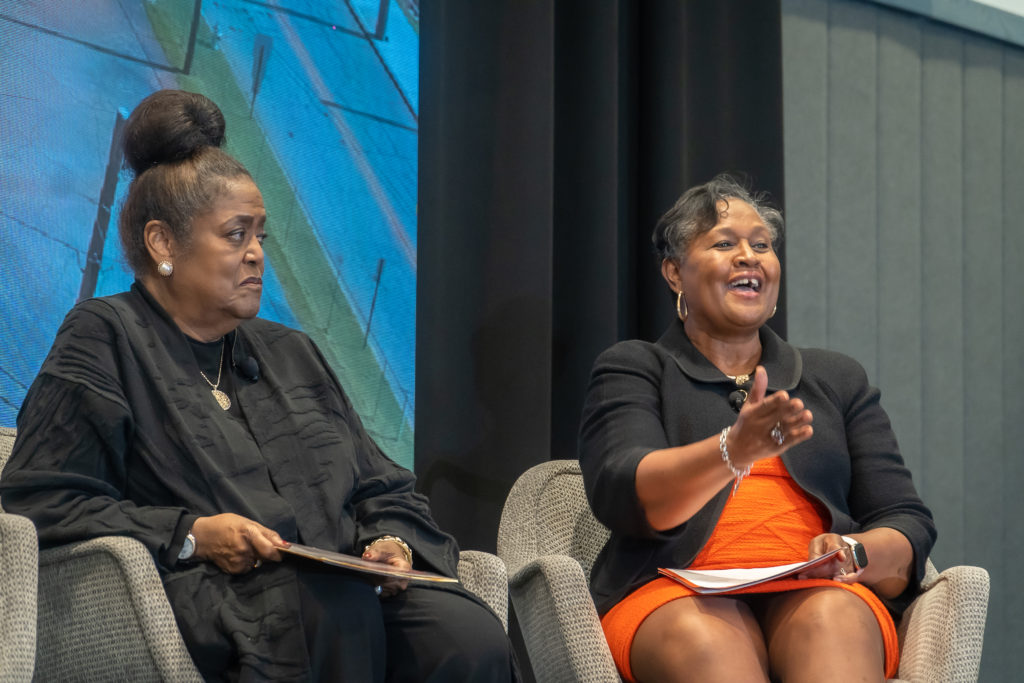
Ingrid Saunders Jones, Board Member and Sharmen Gowens, Chief Executive Officer of YWCA of Greater Atlanta
Gowens: “I’m Sharman Gowens and I’m the CEO of YWCA of Greater Atlanta. It has been my pleasure to lead this organization for the last seven years. Since we’re in a space like this, you know seven is completion and I’m so proud to observe this organization. I mentioned that I am the retiring CEO and it’s been such an honor. Today is actually my last working day, made it to the end…when I called Jennifer earlier this year and told her…I said to her, I will retire on one condition—’that you will allow me to continue to serve on the committee to restore the Phyllis Wheatley YWCA.’”
Ford: “The first question would be for you Sharmen. Tell us a little bit about the history of the Phyllis Wheatley YWCA building and why reopen it now at this point in time?”
Gowens: “This building has been a force in this community since the 1950s. The land was sold to us from Clark Atlanta, who told us even in the deed that this building was to be used ‘for the negros of the Westside community.’ This is a 1944 document and that it could not be sold. In the 1950s, Benjamin E. Mays himself ran the capital campaign to build this building. Atlanta’s Westside community was a thriving area, I don’t have to tell you about this history. You know it, you live in it.”
It built girls into strong women and boys into incredible young men.”
—Sharmen Gowens, Chief Executive Officer, YWCA of Greater Atlanta
“We were in this building actively until 2008. We then leased it out to the Imhotep school. It closed the end of 2014. It’s been standing there. John [Ahmann] mentioned that this particular community started looking. We started here at Westside Future Fund seven years ago, we’ve been here, we’ve been working, thinking about what we could do to restore this building.”
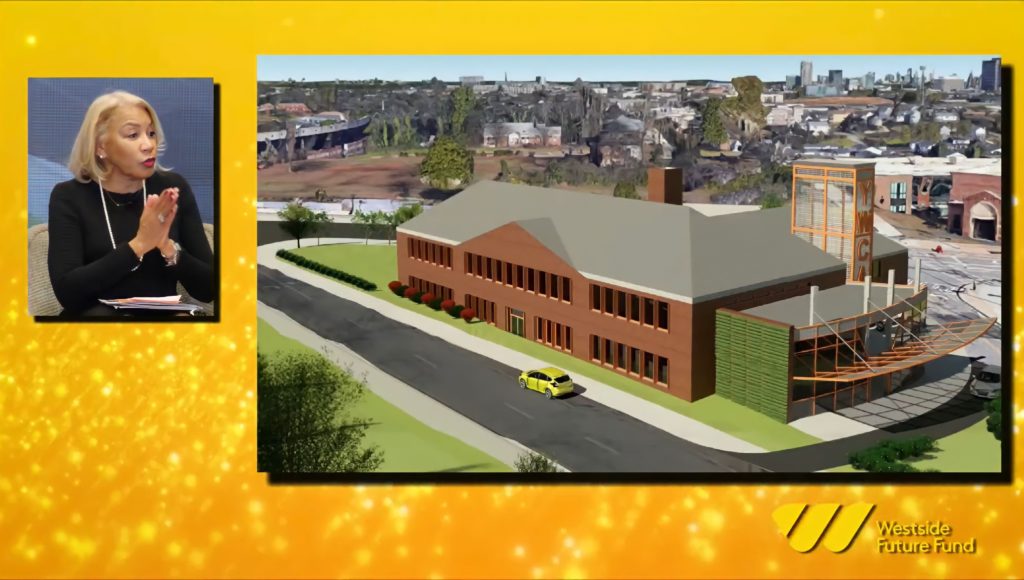
Sarah Lattimer Irvin shared her vision of the revitalized YWCA Phyllis Wheatley Building
Ford: “Sarah, this next question is for you. What is your vision for what the YWCA site will look like when it opens?”
Irvin: “Women told us that they wanted early learning childhood education for their children…bringing that quality education to the women of the Westside was really important to them. They wanted health services, and so we baked that into what we were trying to do. Mental health services was also important to them. There are some things that we’re going to be able to do immediately and some things we’re going to have to work on, like housing, like racial justice, and advocacy.”
“My vision is that it’s going to be a building where women will walk in and feel this hug, like they belong there. This is for you.”
Ford: “I like where you did your focus groups, Magnolia Park apartments, and really in the areas where the legacy residents are residing. So, you got the real voices and the real opinions of the real residents of the Westside.”
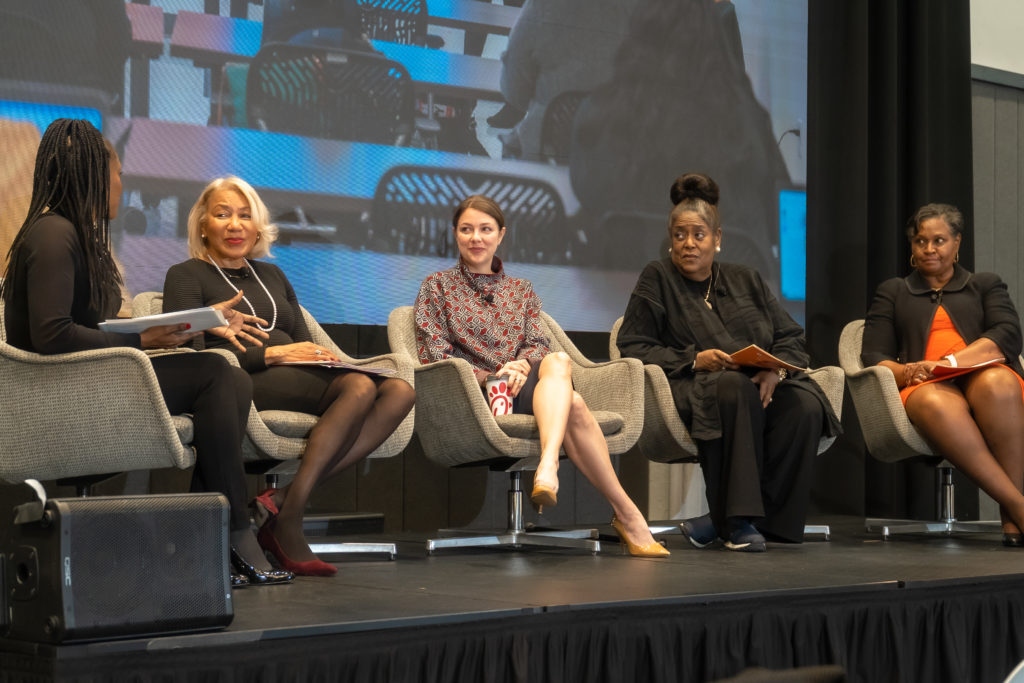
(From left) Ebony Ford, Sarah Lattimer Irvin, Jennifer Winn, Ingrid Saunders Jones and Sharmen Gowens
Ford: “What programs will you offer at the YWCA and how will they be different or additive to the partners that are already working on the Westside?”
Irvin: “We partnered with organizations who are already on the Westside and doing the work. Paula is here from Families First. Families First is one of our partners. Morehouse School of Medicine will help us with health and wellness, doing screenings and education. We also partnered with YMCA who is our partner right across the street…Chris 180 is the other partner. We all hear about mental health and the importance of wellness in that area.”
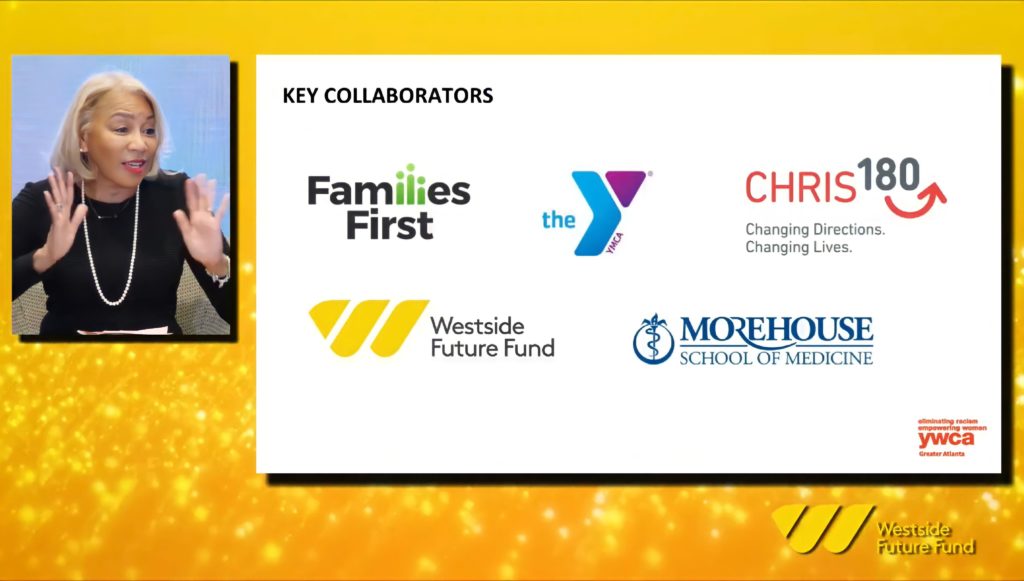
Sarah Lattimer Irvin highlighted key YWCA partnerships on Atlanta’s Westside.
Ford: “The programs that are going to be offered at the Phyllis Wheatley YWCA, why are they needed at this point in time?”
Irvin: “We’re making sure that that our children and women are successful because if you educate a woman, you educate a family, a community and ultimately a nation.”
Ford: “YWCA of Greater Atlanta, what programs are you guys offering right now in the Westside community and how can women who are interested in them get signed up?”
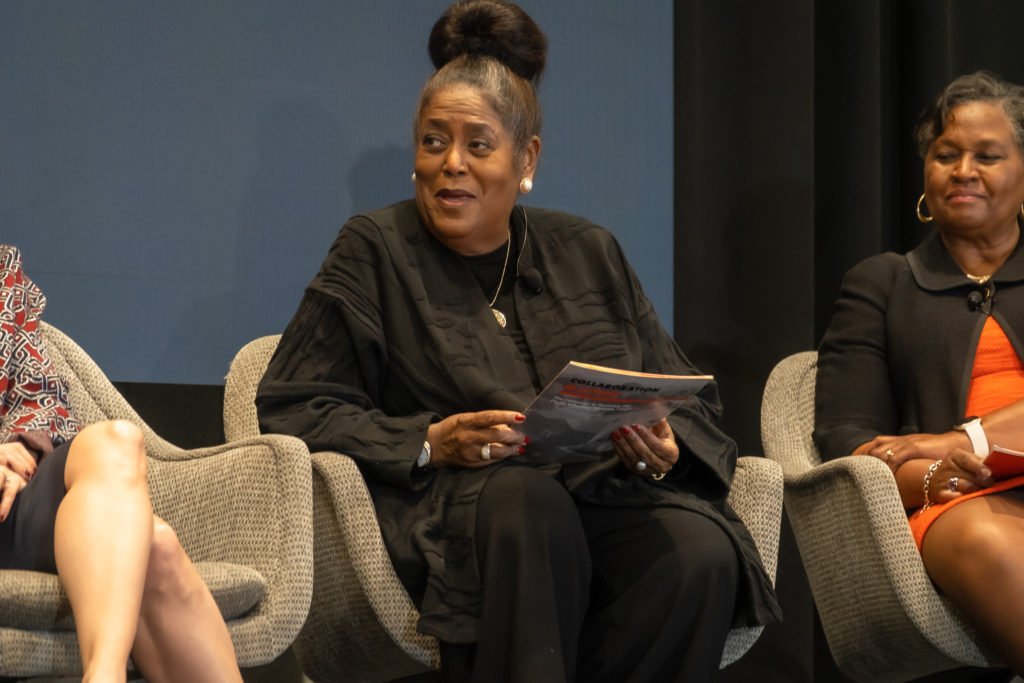
Ingrid Saunders Jones spoke on prioritizing work readiness for women in the digital era.
Jones highlighted the Digital Skills Academy. Slated to start in 2020, the occurrence of the pandemic helped to shift not only how the course was accessed but also the priority level of the skills provided. Participants learn basic computer skills that enabled them to participate in remote work styles.
Jones: “Covid taught us that virtual work was going to be important. So this digital skills training class couldn’t have come at a better time.”
Ford: “Ingrid, who was involved in leading this effort?”
Ingrid Saunders Jones named several key contributors, including Billy Aaron, Alice Ball and former Atlanta Mayor Shirley Franklin, Delta Airlines and Marriott.
Jones: “We have put together robust business routines. We don’t just think about it. We don’t just want it. We have done the work.”
Jones emphasized that Atlanta is known for doing “tough stuff.”
Jones: “We have a way of galvanizing community will and we can do that now…When they chronicle all of the action of the Westside Future Fund, I want there to be a section devoted to women and children. What did we do for the women and children? And, that can start at the Phyllis Wheatley Y.”
Ford: “I want each of you ladies to tell me tell us personally, why you are involved in this?”
Irvin: “I have a very small advertising agency and our focus is on the African American segment. We have a special practice that targets African American women, so I’m always keeping track of what’s happening nationally around African American women. In the Phyllis Wheatley project, we started talking about that. That so appealed to what I do every single day and what I love about women who looked like me, women who say to me all the time, you know, ‘people just don’t see me, they don’t hear me, I’m kind of invisible.’ I wanted to bring visibility to women who look like me, and the Phyllis Wheatley Building was a great opportunity for me to take what I do professionally and do it as my passion project.”
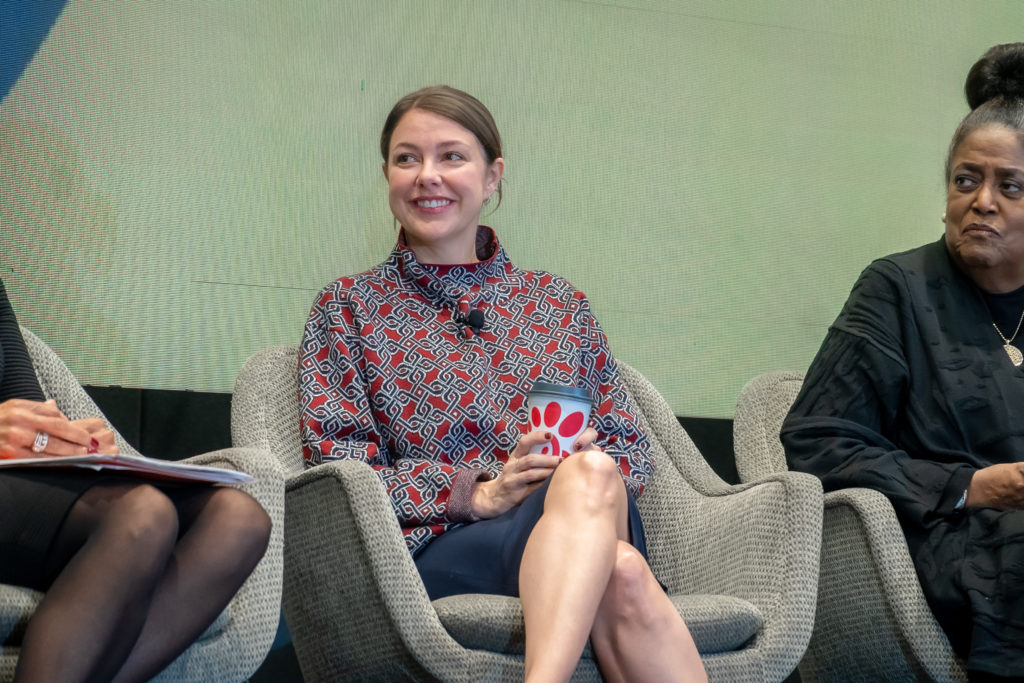
Jennifer Winn, Board Chair, YWCA Greater Atlanta
Winn: “What I really love about this project is in my own life, I know, I see, I feel the challenges of being a woman, a mother, a working woman. I understand the challenges, the struggles with mental illness and I have so many resources to deal with those challenges. I am blessed to have resources. There are so many women who do not have those same opportunities and those same resources, and I can’t imagine how they get through and make it and are such strong, incredible people. So to be able to give that back to someone, or many ones I hope, in this community is just something that I’m very tied to and I hope to be able to continue to be a part of.”
Jones: “How can Atlanta be all that she is and with the statistics about economic mobility? How can we be such a great city and so many of us look into the future and can’t see a better future? Now, Sarah can give you those statistics, but I think it’s just appalling and we have to do everything we can do to change that. And, to other earlier points, when we change the lives of women and educate the children, we can change that statistic, and that is why I am passionate about this project.”
Gowens: “There’s a saying, ‘we’re only as strong as our weakest link.’ But imagine when we strengthen the weakest link, how powerful we will be. We’ll be able to have women who are prepared for the workplace, to be entrepreneurs. Children that we’re raising up, instilling in them the importance of education, and building a foundation preparing them for school. Not only are you preparing them, you’re giving the women power because they don’t have to worry about good childcare for them. They’ll have that right there in that building.”
Ford closed the panel discussion with reflection of her personal journey of being empowered by the right community resources at the right times after going through a divorce. A single mother once challenged with navigating childcare, workforce readiness, reentering the workforce and becoming the sole provider for her family, she praised the YWCA‘s commitment to bring more resources to Westside women and children.
Ford: “…if it wasn’t for that foundation pulling me up, I wouldn’t be here to provide for my child right now. This resource is coming up for women who will be going through what I went through and I can’t wait to see it.”
View the full summit including the audience Q&A below!
